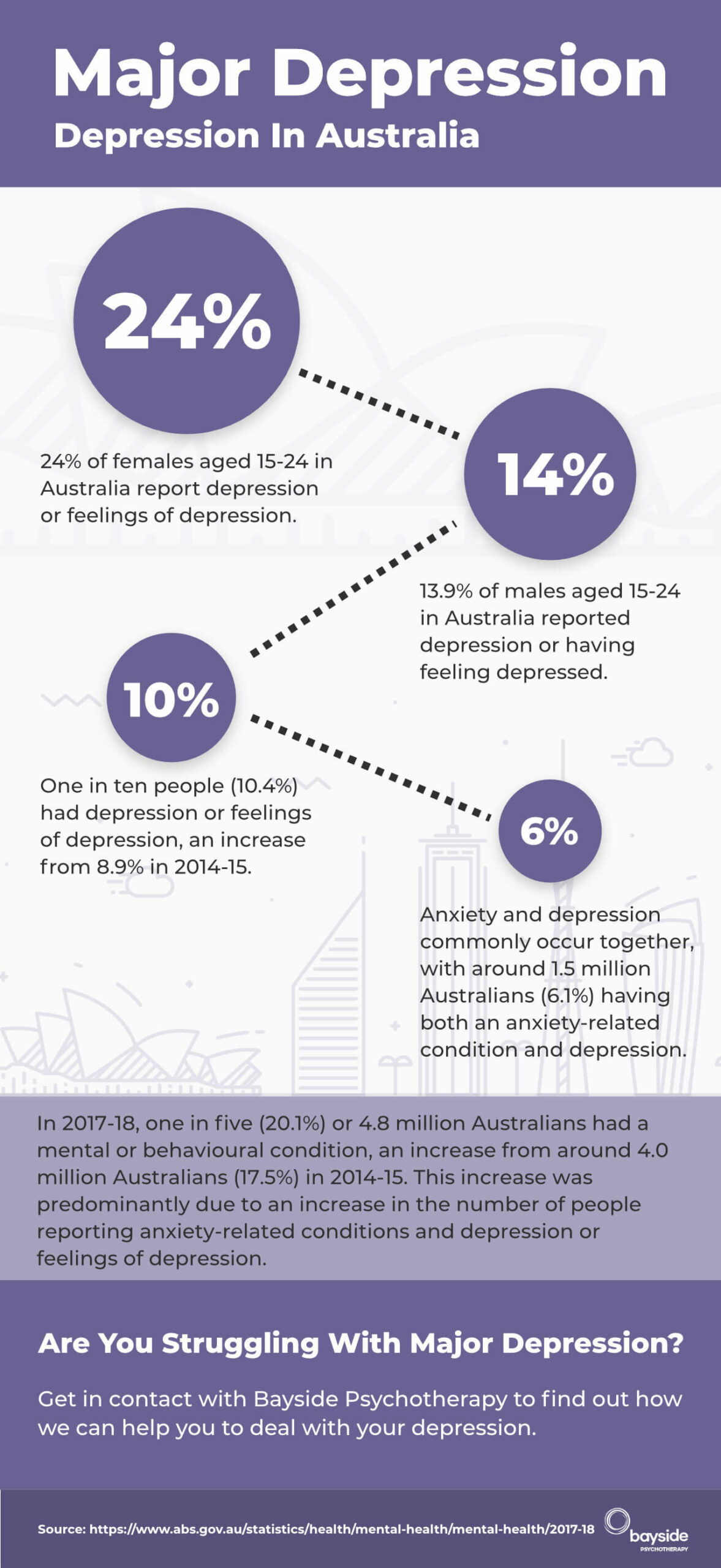Most people have periods of feeling depressed. Life is filled with ups and downs. But, depression can become problematic or even serious when the down periods persist. When depression starts to take over your life and prevents you from being productive and from having healthy relationships, it may be helpful to seek depression counselling.
Bayside Psychotherapy may be able to provide you with the professional counselling that can help you manage depression in your life and deal with emotions and issues related to depression. For many who suffer from depression, cognitive-behaviour therapy (cbt) is a means of gaining back a sense of improved health and wellbeing. The impact of depression of our daily lives can be devastating, early intervention is key.

What Is Depression?
Anxiety and Depression are a very common psychological disorder, where 30-40% of Australians experience depression at some stage in lifetime, depressive bouts may only last weeks or months and resolve on their own. Depression is a complex health issue with a number of possible contributing factors including:
- Genetics (i.e., having a family history of depression)
- Life stress (such as divorce, housing and financial stress
- Troubled interpersonal relationships
- Having a pessimistic outlook on life.
- Lowered self-esteem
- Grief and loss
- A history of childhood abuse or neglect
- Medical conditions and disabilities

Types of Depression
Depression is a blanket term for a variety of mental health issues and disorders that present differently. Symptoms of anxiety and depression vary from person to person but can usually be categorised into a few different types. Below are some of the most common types:
Major Depression
Major Depression, often referred to as Major Depressive Disorder (MDD), is a mental health condition characterised by intense feelings of sadness, hopelessness, and a lack of interest in daily activities and hobbies.
These feelings persist for at least two weeks and can interfere significantly with daily functioning. Factors contributing to MDD can include genetics, brain chemistry imbalances, trauma, and stress. Major depression is treatable and usually involves psychotherapy, such as cognitive behavioural therapy, and antidepressant medications. Early intervention is vital to manage symptoms and improve quality of life.

Persistent Depressive Disorder
Persistent Depressive Disorder (PDD), also known as dysthymia, is a chronic form of depression lasting at least two years. Its symptoms, including a consistent low mood, fatigue, difficulty concentrating, and changes in appetite or sleep, are milder but more enduring than major depression. The causes may be unknown but counselling and psychotherapy treatment usually looks at a mix of biological, psychological, and environmental factors.
Treatments like cognitive-behavioural therapy can be hugely beneficial to those suffering from PDD. Persistent Depressive Disorder often impacts our work or study and can damage overall well-being.
Bipolar Disorder
Bipolar Disorder is a mental health condition marked by alternating periods of elevated mood (mania) and depression. Mood swings can be extreme, causing all kinds of problems in daily life. The exact cause for Bipolar Affective Disorder may be currently unknown, but psychologists and counsellors believed it to be a combination of genetics, brain structure, and environmental factors.
Treatment typically includes mood stabilisers, psychotherapy, and sometimes antipsychotic medications. Recognising and managing bipolar disorder is crucial, as it can impact relationships, work, and overall well-being.
What Causes Depression?
Many factors can cause depression, but some of the most common causes are significant life changes, childhood trauma, and ongoing challenges such as problems with your family, financial stress, illness, and disability.
There is also usually no single cause of depression. Your genes and environment and your thinking patterns and behaviours can all contribute to the way you feel. That’s why so many people say that depression isn’t just a reaction to life’s ups and downs but rather a physical illness as real as diabetes or asthma.
Once you understand what contributes to the way you feel, you have the ability to learn what to do to start feeling better.
Should I Take Anti-Depressants?
That is between you and your doctor or psychiatrist. If you need help overcoming withdrawal from antidepressants, our psychotherapists may help with that as well. If you are thinking about medication for depression, make sure your doctor takes a balanced, objective perspective on the matter, and doesn’t bias a biological perspective over psychological factors. You can show your doctor this article titled The Depressing News About Antidepressants.
Need depression therapy?
Connect With a TherapistCommon Depression Symptoms
People with depression often report a low mood or depressed mood, other symptoms include:
- Feeling ‘Heavy’
- A loss of interest or “can’t be bothered” mentality
- Fatigue and loss of energy
- A change in appetite, weight or sleep patterns.
- Thoughts, plans or actions of self-harm or suicide
- A change in activity levels
- Feelings of guilt and worthlessness
- Difficulty concentrating
- Difficulty making decisions
- Suicidal Thoughts
When Will I Start Feeling Better?
As every person is different, it’s hard to say exactly how long treatment will take. Some people may begin to feel relief from the symptoms of depression only after a few sessions, while others may benefit from regular, ongoing sessions. The act of taking control of your situation (instead of continuing to let it control you) is empowering enough to make some difference on its own. Treatment types and timelines will vary based on the individual.

Seeking Depression Treatment
The trained psychotherapists at Bayside Psychotherapy offer a counselling service to help you to begin dealing with depression, with their extensive training and knowledge of treating depression; effective counselling can help improve mental health and wellbeing. Speak with a qualified counsellor today.
Self-hypnosis may also be a valuable tool and you can download recommended hypnosis recordings here.
Don’t let depression rule your life and steal your happiness!
Call us on (03) 9557 9113 or use our contact form to enquire. Let’s work together to see if we may be able to help you combat your depression.
You can also book an appointment by using our online booking form for online appointments. Or, if you prefer, you can book an in-clinic session.
Our unique combination of Mindfulness therapy, counselling and hypnotherapy may help you get on top of your depression.
You can make an appointment for online counselling via Skype, or you can come into our Highett clinic for face-to-face counselling. Please call us on (03) 9557 9113 or use our online form to find out if we can help you manage depression.
You can also download our recommended Depression Self Hypnosis recording that may compliment your sessions.
How Does Bayside Psychotherapy’s Approach Treatment for Depression?
Several treatment options are available to you at Bayside Psychotherapy. Rather than using a uniform approach to patients, we tailor our approach to your unique situation. Our psychotherapists have training in counselling, psychotherapy, hypnotherapy, NLP and Buddhist psychotherapy, which means we have a wide range of tools available. We may use a combination of treatments to, potentially, help you through your depression.
You can make an appointment for online counselling via Skype, or you can come into our Highett clinic for face-to-face counselling. Please call us on (03) 9557 9113 or use our contact form to find out if we can help you manage depression.
You can also download a recommended Depression Self Hypnosis recording that may compliment your sessions.
Note: This information is informative only and is not to be used for diagnosis or substitution of appropriate assessment and/or treatment by a registered practitioner. Information on this page and our entire site should not be construed as implying that our therapists are specialists in treating any condition whatsoever. While some of our therapists may have experience working with people suffering from a specific condition, not all of our therapists do. We do not guarantee any particular level of performance, cure or management of symptoms. Each case is unique and responds differently with collaboration between client and therapist being crucial. Always seek an appropriate assessment from a qualified professional such as a GP, psychiatrist, clinical psychologist or social worker especially if you are acutely distressed. If you are in immediate crisis, please call lifeline on 13 11 14, or contact emergency by calling 000 within Australia.










